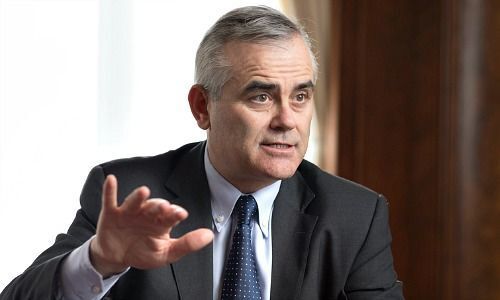More Than Ever, Credit Suisse Needs Switzerland
Credit Suisse's favorable first quarter belies the challenges ahead. Here are the seven biggest points to watch for at the Swiss bank.
Thomas Gottstein was probably looking for a smoother start to his tenure as CEO of Credit Suisse – instead, he is navigating the Swiss bank through a pandemic and ensuing economic crisis from his study in a lakeside suburb of Zurich. finews.com compiled the seven key points from the Swiss banker's inaugural turn at the helm – not all of which can be chalked up to the coronavirus.
1. Credit Suisse Needs Switzerland
A «high dependence on the resilient Swiss economy» is one of its biggest strengths – the statement is noteworthy. More than ever, Credit Suisse is emphasizing just how much it leans on its sturdy and profitable domestic business strategically.
The numbers tell a fuller story: from 2017 until last year, Credit Suisse's average adjusted pre-tax profit stood at 3.7 billion francs annually, of which the domestic market made for 38 percent. The Swiss market is also far more resilient compared to those of the other units: nowhere are provisions for credit losses as low as in the domestic market.
2. Good Result, Thanks to Smokescreen
Investors wanting to parse Credit Suisse's performance would have to take a close look: the first quarter was not only skewed by the onset of the coronavirus outbreak, but also through the disposal of Investlab, which closed just days before the quarter closed, as well as a negative tax rate.
These factors bloated profits, which would have collapsed by 23 percent without them, by 739 million francs. Against this backdrop, its claim that it matched 2019's first quarter pre-tax profit after just two months of this year is somewhat of an embellishment.
3. Investment Banking Yet to Prove
Advisory and capital markets is proving more and more worrisome for Credit Suisse: even without the 155 million francs, the division would have posted a pre-tax loss – just as one year ago as well as in the fourth quarter of last year.
Leveraged lending and derivatives collapsed – two of Credit Suisse’s standout Wall Street businesses. The wider unit’s cost-cutting is going to plan, but the investment banking and capital markets division is far from proving it is a pillar for the bank. The dour outlook for advice-giving and underwriting lends little hope for that to change anytime soon.
4. Tidjane Thiam's «Ugly Ducklings» Are Back
Despite an exhausting three-year restructuring under Gottstein's predecessor, Tidjane Thiam, Credit Suisse experienced a déjà-vu in the first quarter: just like in 2016, a tumble in oil prices haunted its investment bank. Despite a steeper fall as well as a wider economic standstill, Credit Suisse lost less money than last time around: in 2016, it was roughly 500 million, this year the losses are estimated at 444 million francs.
The «de-risking» appears to be working. The wider unit's abysmal showing (a 392 million franc loss for investment banking and capital markets) illustrates that Switzerland's largest investment bank is still sailing close to the wind with products that Thiam once referred to as its «ugly ducklings».
5. Private Banking: How Deep is the Cut?
Credit Suisse has been running circles around UBS on lending to wealthy clients for years now. The first quarter – the begin of the corona crisis – offered some assurance that the bank had still been somewhat prudent: loans didn't collapse, provisions for dud credit only really hit the bank's pre-tax profit in Asia, while interest income in private banking actually edged higher.
The promising start belies the risks: managed assets tanked by 9 percent, which will translate into falling fees of those assets. It is questionable whether clients will keep Credit Suisse's trading engine busy – and commissions fed – amid the looming deep recession.
6. Is Asset Management the New Black Box?
Credit Suisse’s institutional management arm raised several questions this quarter. The bank warned in its outlook that it would probably have to write down more of the value of its investments. In the first quarter, the hit was 101 million francs.
The bank had seeded fund and product launches with its own funds – investments that are highly sensitive to financial market ructions. Another bout of volatility will wipe out more value in Credit Suisse's investments. The bank doesn't disclose exactly how much seed money it put to work – and stands to lose.
7. Get Rich From Saving Money
If Credit Suisse is in a maelstrom, it hasn't lost its ability to whip its budget into fighting shape. It lowered spending in the first quarter by 6 percent to 4 billion francs, which flattened its cost-income ratio to 53 percent (compared to 58 percent a year ago).
In particular, it punched down costs at its investment bank, which fell five percent on the year – mainly thanks to lower bonuses and compensation for bankers. At the same time, spending on major litigation provisions, restructuring, and expenses related to real estate disposals from last year's first quarter fell away.



























